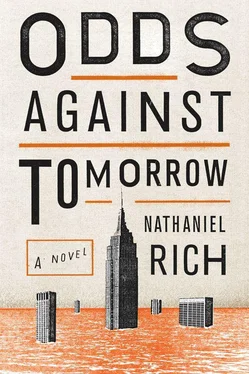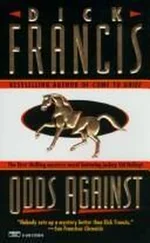“Stop. Mitchell?”
“What?”
“Right now I don’t want to be alone.”
8.
She gasped audibly when the power went. There was a sound like a record player flipped off mid-song. The lights shuddered. Somewhere in the distance a man screamed.
They had been watching television at the time, long enough to see the local news switch over to the national broadcast. The streets were finally empty, the ground white with the force of the rain exploding in steady bursts. The George Washington Bridge, thronged with cars and stragglers walking with their heads bent under the punishing rain, rocked gently from side to side, a cradle over the churning abyss of the Hudson River. The wind hammered like a crowbar at the Victorian houses on Rockaway Beach. Slate shingles boomeranged through the air in Bay Ridge. The East River breached the barricade of the FDR Drive, the impact of the waves creating vertical geysers of arctic-white spray that fixed in the air like holographic mist. In one particularly unsettling tableau, a cameraman had filmed the iridescent purple corpses of pigeons floating in the Central Park reservoir; in other parts of the park the rain had fallen with such ferocity that it filled the birds’ overhead nostrils and drowned them where they stood. There were reports of looting but also of supermarkets providing their stocks of fresh food to whoever passed by — the electricity was out, so the frozen meat was thawing, the ice cream melting. There were press conferences in Washington, Albany, Hartford, Brooklyn, City Hall. The politicians wore expensive rain slickers, but as if in solidarity with their constituents their hair had been carefully drenched and lay on their heads like wilted cabbage.
“He’s terrified,” said Jane when the mayor spoke from his podium. “You can see it in his eyes. He looks like a little boy who lost his mother in the supermarket.”
Though the window was shut, a sour mist sprayed into the room with each strong gust. Jane was the first person Mitchell had let into his apartment, and he couldn’t quite get comfortable. He kept looking around for things to tidy up, but after nudging the Psycho Canoe against the wall, he didn’t really know where to begin. The disorder was suddenly impossible and unbearable.
“I have to make a phone call,” he said, handing her the remote.
Jane pursed her lips as if she were going to say something, but one look at Mitchell and she turned back to the screen. He went into his bedroom, closed the door behind him, and made the call.
As usual, the nurse at Augusta General explained that nothing had changed. Yes, they were doing everything they could. Yes, they had a backup generator in case a storm put the electricity out. Yes, she had his number and would alert him if Elsa’s condition changed. He hung up and returned to Jane.
Outside the wind was calling to them. Oooh, it said. Oh oh oh ooooooh. Oh. Oh. Oh!
Jane was watching a live press conference held by a Colorado Springs preacher. The man spoke like a high-ranking general: curt, supercilious gestures and a magnanimous tone, with significant, heightened pauses. He wore delicate spectacles that magnified his gentle blue eyes. The Colorado sky was bright and wide.
“Never has the wickedness of mortal man been greater than now,” he said. “When the earth was filled with blood violence and all flesh had been corrupted, God did not tell Noah that the destruction of man would come by gun, bomb, or missile launcher. No, death would not come by any tool of man. God said, ‘I will destroy them with the earth .’ And today you can see that our modern Babylon is being overwhelmed by the earth in a great alluvion. Every man, beast, fowl, and thing that creepeth across the earth must repent.”
“What a preposterous man,” said Jane, hugging herself. She changed the channel back to the local news. It was broadcasting an image of the Hudson, which was now melted caramel, muddied with sediment dredged from the riverbed. Splinters of wood whipped through the air. Newscasters were no longer reporting from the street — it was too dangerous — so the pictures were taken by cameras that had been left behind, beaming their images to satellites. There were no people visible anywhere, in fact. Tammy had already accomplished what financial collapses and terrorism and heat waves had failed to do: it had emptied New York’s streets of its people.
“I guess I was wrong about FutureWorld,” said Jane. “You have to give Charnoble credit.”
“For what? Exploiting fear to make money?”
“Well, yeah. You do have to give him credit for that. I mean, just last week I bought a dress that costs more than my monthly rent, even though I have no place to wear it. I can see you’ve been indulging too.” She tilted her head toward the Psycho Canoe.
“Impulse buy,” he said.
“Yeah, exactly — we’re making enough money now to buy almost whatever we want, when we want it. But there’s another side to this thing. I mean, as crazy as it sounded at the time, the advice I gave my clients about hurricane evacuation is going to be useful. The numbers we ran were valid, after all. The time series was accurate and the stochastic process bore out. Our warnings might save lives.”
Unnnh, said the wind. Ummmm. Unnnh.
“I don’t think Charnoble cares about anyone’s life but his own.”
“You’re right. But the business will help people despite that. Look at what’s going on.” She pointed to the television, where water was shown galloping up the steps of a subway station entrance on Eighth Avenue. “You can’t just pretend anymore that the unusual will never happen. It will.”
“I know it, believe me.”
“Every business needs a bank, a law firm, an insurance company, an advertising firm. I think they’re going to realize soon that they also need a future consultant. Not just to protect them from lawsuits, but to protect them from, well, this .”
The power cut out with a tapering electronic sigh, as if it were relieved to exit the scene before the real destruction began. Mitchell tried his cell phone, but the signal was gone. After the surprise wore off, he realized he was grateful for the darkness, the silence. For a long time he and Jane sat listening to the squealing wind and the thunder that was like the roar of an ensnared beast.
9.
Everything got worse.
If he weren’t on the third floor he would have sworn there was a man outside the window, a huge man pounding with his fists against the glass, demanding to be let in. They had to barricade it. Mitchell went over to the corner where the pile of wooden staves from the canoe crate still lay in a messy pile. As soon as Jane realized what Mitchell was doing, she pitched in, carrying the staves to the window and snapping the longer pieces over her knee. They laid the wood over the window in horizontal bands, using duct tape to hold them in place, following the example Tibor had set on that long-ago day in Overland Park. It was the only window in the apartment, but they weren’t losing much of a view. The city had been blanketed by an uncanny iron darkness. The only time they could see anything was when the lightning struck, filling the sky with baroque blue designs. What they saw in those brief flashes hurt Mitchell’s stomach.
Third Avenue was now a canal, the water so high it had begun to spill over the curb. The ramp that led from the avenue to the Queens Midtown Tunnel was a cascading stream, the water leaping over itself as it rushed down the incline. The wind levitated the crushed skeletons of umbrellas, garbage cans, chunks of scaffolding. Bricks blurred through the air, hurtling like poorly thrown footballs until they pulverized against the sides of buildings. Or shot through windows.
Читать дальше












